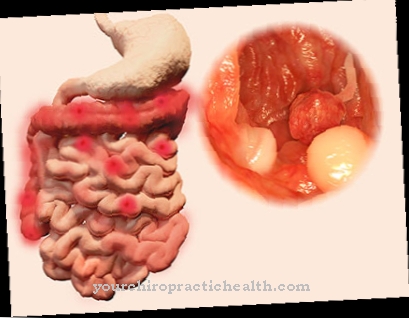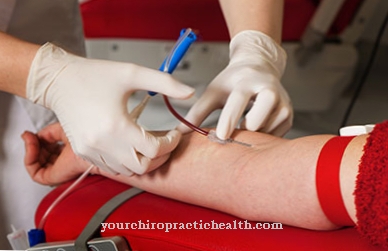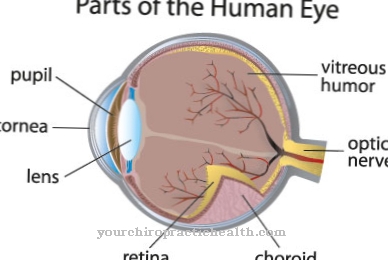The Goodpasture Syndrome is a rare but severe autoimmune disease that particularly affects the lungs and kidneys. The disease cannot be cured.
What is Goodpasture Syndrome?

© maya2008 - stock.adobe.com
Goodpasture syndrome was first described by the American pathologist Ernest William Goodpasture in 1919. He drew a picture of a certain type of kidney inflammation combined with bleeding from the lungs.
It is now clear that kidney inflammation is a rapidly progressing glomerulonephritis. Goodpasture's syndrome is a type II autoimmune disease in which antibodies against components of blood vessels are formed, particularly in the kidneys and alveoli. Type II autoimmune diseases belong to the type II allergies. These are allergies of the cytotoxic type.
The body forms immune complexes against cellular antigens. As a result of the subsequent immune reaction, the body's own cells are destroyed. The disease is extremely rare. There is a maximum of one case for every 1,000,000 people per year. The disease is most common between the ages of twenties and forty. Men are affected twice as often as women.
causes
As already described, Goodpasture syndrome is an autoimmune disease of type II. The patient's body forms antibodies against the so-called Goodpasture antigen. In the sick person, this sits in the alveoli and in the basement membrane of the kidney. The basement membrane is a thin layer of tissue in the kidney corpuscles. The antibodies attack the Goodpasture antigens within these structures and destroy them.
This process causes severe inflammation within the kidneys and lungs, which severely impair the function of the organs. While the kidney is always affected, lung involvement is not mandatory. Goodpasture syndrome is therefore also referred to as glomerulonephritis with lung involvement. With pre-existing lung diseases, smoking and previous exposure to hydrocarbons, the risk increases that the lungs will also be damaged by the disease.
You can find your medication here
➔ Medicines to strengthen the defense and immune systemSymptoms, ailments & signs
Those affected are symptom-free for a relatively long time. At the beginning the disease manifests itself only through uncharacteristic symptoms such as loss of appetite or vomiting. Later, the symptoms of progressive glomerulonephritis come to the fore. Damage to the small vessels in the kidney corpuscles leads to the transfer of proteins into the urine.
Edema forms as a result of the loss of protein. This is particularly noticeable through swelling in the area of the eyes and later also in the area of the lower legs and ankles. Protein and possibly blood can be detected in the urine.
If more red blood cells get into the urine through the damaged vessels, it appears pink to reddish in color. The blood loss can lead to anemia with symptoms such as hair loss, fatigue, and fatigue. If left untreated, glomerulonephritis quickly turns into terminal renal failure with acute kidney failure.
Symptoms of kidney failure are itching, bone pain, edema, headache, fatigue, heart failure or gastrointestinal complaints. Lung involvement leads to shortness of breath and coughing. In the late stages, those affected cough up blood. Here, too, the loss of blood can result in anemia or exacerbate existing anemia. In addition, the bleeding inside the lungs causes iron deposits and thus pulmonary siderosis.
diagnosis
If Goodpasture syndrome is suspected, antibodies are determined using indirect immunofluorescence. Indirect immunofluorescence tests whether there are antibodies against the body's own cells in the patient's blood serum. For this purpose, the patient's blood serum is placed on a cell substrate and washed down again after a short time. Only bound antibodies remain on the cell substrate.
An antibody labeled with fluorochrome is now bound to the substrate. This also binds to human antibodies. If, in the first step, antibodies have adhered to the substrate, the second antibodies that have just been added bind to these antibodies. These antibody complexes can be detected with a fluorescence microscope.
X-rays of the lungs can reveal damage. A lung biopsy may be done. A kidney biopsy can also be done to diagnose Goodpasture syndrome. Crescent moons can then be detected in the kidney tissue. These are absolutely typical of the autoimmune disease.
Complications
The symptoms and complications caused by Goodpasture syndrome vary widely and in most cases do not show up until the end of the disease. This leads to vomiting, diarrhea and loss of appetite. The loss of appetite can also lead to malnutrition, which is a very threatening condition for the patient's health.
The kidneys are also damaged, which in the worst case scenario can lead to kidney failure. In this case, the patient then has to rely on dialysis in order to survive. There are also symptoms of the eyes, which are often swollen. The patient feels tired and sick and suffers from hair loss. Headaches and body aches are also common. Furthermore, the airways are infected, which can lead to breathing difficulties and shortness of breath.
Coughing up blood then also occurs not infrequently. The complaints put an extreme strain on the patient's everyday life and lead to a reduced quality of life. Treatment of Goodpasture's syndrome is imperative, otherwise death will result. There are no other complications from treatment, with a death rate of around 20 percent. If the disease is defeated, there will be no further complaints.
When should you go to the doctor?
Since Goodpasture syndrome does not heal itself, a doctor must be consulted in any case. This significantly increases the patient's life expectancy, even though the disease itself cannot be cured. A doctor should be consulted if persistent vomiting and loss of appetite occur. Swelling of the eye or protein in the urine can also indicate Goodpasture syndrome and should always be examined by a doctor.
Many patients also suffer from blood loss and thus permanent fatigue and exhaustion. In addition, a visit to the doctor is necessary if the person concerned often suffers from headaches or bone pain. It also causes itching and discomfort in the stomach and intestines.
If Goodpasture syndrome is left untreated, breathing difficulties will also arise, which must definitely be investigated. The first examination of the syndrome is done by a general practitioner in most cases. For further treatment, however, the use of various specialists is necessary to alleviate the symptoms.
Doctors & therapists in your area
Treatment & Therapy
If left untreated, Goodpasture syndrome always leads to death. Even under therapy, mortality used to be up to 90 percent. Today the prognosis has improved significantly due to the glucocorticoid therapies used. Cortisone preparations and additional immunosuppressants are used. These inhibit the function of the immune system. Preparations such as azathioprine or cycylophophamide are used.
A plasmapheresis can have a supportive effect. During plasmapheresis, the patient's blood plasma is completely exchanged using a plasmapheresis device. The antibodies against the Goodpasture antigen are eliminated. If the lungs are involved, smoking should be stopped immediately. It is also advisable to treat every lung infection with antibiotics immediately.
Treatment for Good Pasture Syndrome takes eight to twelve months. With the therapy, the chances of survival of the affected patients have increased dramatically. The mortality could be reduced to below 20 percent. However, the disease cannot be cured. Recurrences, so-called rebounds, are possible at any time.
Outlook & forecast
A complete cure is not possible with Goodpasture syndrome, as it is a genetic disease that can only be treated symptomatically. If left untreated, the syndrome will in most cases lead to premature death. With the help of immunosuppressants, some of the symptoms can be alleviated, whereby those affected are dependent on lifelong therapy.
If the person concerned smokes, the symptoms usually worsen and life expectancy is reduced. Goodpasture syndrome also generally severely affects the patient's life. The person concerned cannot participate in sporting activities and should not expose himself to physical stress. This can also delay development in children, leading to stunted growth or developmental disorders.
It is not uncommon for Goodpasture's syndrome to be associated with psychological complaints or even depression that occur as a result of the disease. In everyday life, those affected often suffer from severe pain despite treatment and can therefore not easily pursue normal activities. Due to the lack of appetite, deficiency symptoms often occur that have to be compensated for.
You can find your medication here
➔ Medicines to strengthen the defense and immune systemprevention
Since it is not known what causes the formation of antibodies against the body's own cells, Goodpasture syndrome cannot be prevented. Since the disease is fatal without therapy, early diagnosis is very important. Only in this way can severe organ damage be prevented and those affected can lead a largely normal life.
Aftercare
With Goodpasture syndrome, the options for aftercare are very limited. Since the disease cannot be cured, those affected usually need lifelong therapy to alleviate the symptoms. Self-healing cannot occur.
Furthermore, the life expectancy of the patient is usually significantly reduced and restricted by Goodpasture syndrome. In most cases of Goodpasture syndrome, those affected are dependent on the use of medication. It is important to ensure that it is taken regularly, and possible interactions with other medications must also be taken into account.
In case of doubt, a doctor should always be consulted. In the case of children, the parents are primarily responsible for the correct and, above all, regular consumption of the medication. Regular blood tests are also necessary in order to detect disorders of the immune system at an early stage.
In general, people affected by Goodpasture syndrome should always protect themselves from diseases and infections in order not to unnecessarily burden the immune system. Infections must be treated immediately with antibiotics, whereby alcohol must not be consumed when taking antibiotics. Furthermore, contact with other people with Goodpasture syndrome can be useful.
You can do that yourself
Goodpasture syndrome cannot be treated through self-help. Those affected are dependent on medical treatment, although it cannot be ruled out that the sick person may die, as the disease leads in many cases to kidney failure. Even after successful therapy, the disease can come back.
Many sufferers need emotional support because of the illness. This can mainly be given by friends and family. In serious cases, a psychologist or a therapist can be consulted.
If a child suffers from Goodpasture's syndrome, a clarifying and detailed discussion about the disease must be held in order to inform the child about the possible course of the disease. Discussions with other affected persons can also help and psychological complaints and depression can be avoided.
Since the patients suffer from severe restrictions and pain in their everyday life, the body should always be spared. You should therefore refrain from strenuous work in order not to aggravate the symptoms. In addition, the patient should eat and drink regularly despite the loss of appetite in order to avoid deficiency symptoms.




.jpg)







.jpg)



.jpg)










.jpg)
